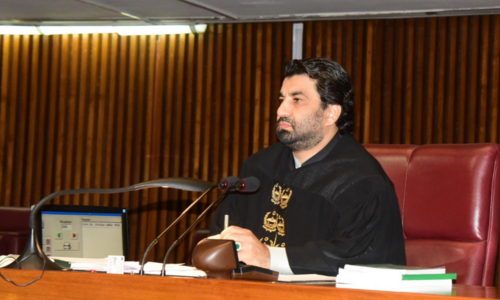ISLAMABAD: The Supreme Court has issued a detailed judgement explaining the reasons behind its decision to set aside a controversial ruling by the National Assembly speaker on April 3 that dismissed the no-confidence motion against then prime minister Imran Khan.
In the verdict authored by Chief Justice Umar Ata Bandial, the top judge stated that by dismissing the no-confidence motion against Imran Khan, Mr Suri prima facie breached his constitutional duty. Justice Bandial said the April 3 ruling failed to qualify for protection of the internal proceedings of parliament under Article 69(1) as it was “not the outcome of a vote in the national assembly instead, it was a unilateral decision”.
Justice Bandial observed that the controversial action by the deputy speaker triggered a chain of events, the most concerning aspect of which was that it allowed the then PM to claim the constitutionally repugnant outcome of avoiding the no-trust motion without a vote by the assembly.
The court’s foremost priority was the maintenance of constitutional order which could only be achieved if the assembly was restored, Justice Bandial added.
Justice Bandial says text of cypher not shown to court, contents were only ‘partially disclosed’
Cypher not shown to court
Justice Bandial, while referring to the cypher used by Mr Suri to dismiss the motion against Imran Khan, explained that the text of the cypher was not shown to the apex court, though its contents were partially disclosed in the detailed reasons issued in support of the deputy speaker’s ruling.
The detailed reasons in addition to cabinet decision of April 2 acknowledged the need for an inquiry to establish the alleged collusion between the opposition and a foreign state.
“Such an inquiry into facts can, in the first place, be carried out either by a commission constituted by the federal government under the 2017 Act or by a specialised commission constituted under an Act of parliament or an ordinance,” Justice Bandial observed.
The PTI’s plea that the apex court should take suo motu over the defence of national security and allegation of breach of sovereignty was without precedent, the ruling explained.
Moreover, the opposition members who filed the notice were granted leave to move the motion against the then PM on March 28, crystallised the constitutional right and obligation for there to be a vote under Article 95(2) on the motion.
This right/obligation cannot be defeated or curtailed except by a vote on the floor of the assembly, the ruling said, adding: “Since the deputy speaker’s ruling unilaterally refused the right of vote granted by the constitution, no immunity under Article 69(1) attaches to it and the same can be reviewed by the court.”
High treason
Meanwhile, Justice Mazahar Alam Khan Miankhel, who retired on July 13, in his additional note observed that the exercise of authority was a sacred trust which was violated by the president, then PM, the then speaker, the then deputy speaker and the then law minister.
“Whether these acts attract Article 6 of the Constitution (high treason) is also left open to be determined by the parliamentarians to ponder should they leave open the doors for such unconstitutional acts or take suitable measures to stop such like mess in future,” Justice Miankhel suggested.
The elected representatives of the people were prevented from voting on the resolution and for such blatant transgression of the Constitution there must be consequences and the law must take its course, Justice Miankhel added.
‘Doctrine of necessity’
Justice Jamal Khan Mandokhel, in his additional note, observed that the action of the deputy speaker was biased, on the basis whereof, if permitted to hold fresh elections, would amount to giving licence to an authority to misuse the extraordinary power of the doctrine of necessity.
This country has already experienced misuse of the doctrine of necessity by the hands of unconstitutional forces time and again, which were legitimised by the apex court, but it did not achieve the desired results, he added.
Rather, the democracy suffered a lot because of misuse of the doctrine of necessity, Justice Mandokhel observed. He added the courts must discourage every action, which was contrary to the constitution and democratic norms.
Published in Dawn, July 14th, 2022












































